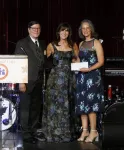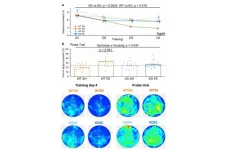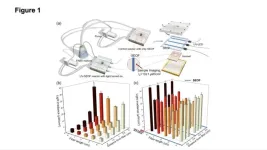(Press-News.org) Many girls in low- and middle-income countries struggle to buy products to manage their periods, which can cause them to skip school. So, ensuring they have access to menstrual products is critical.
A new Kenya-based study from University of Illinois Chicago researchers shows that the benefits of one kind of menstrual product — a menstrual cup — extend well beyond educational access. Teenage girls who were given menstrual cups were less likely to acquire certain kinds of vaginal infections and were more likely to have a healthy vaginal microbiome, the study found. The findings are published in PLOS Medicine.
The research, which was funded by the National Institutes of Health, followed 436 Kenyan secondary school girls, half of whom were given menstrual cups. They were tested every six months for bacterial vaginosis, a common type of infection, and at 12 months and 30 months for sexually transmitted infections. The researchers also tested participants’ vaginal microbiome to determine the relative prevalence of beneficial and harmful bacteria.
At the end of the study, the girls with menstrual cups were 26% less likely to have bacterial vaginosis and were 37% more likely to have an optimal vaginal microbiome than the girls who didn’t receive a cup. Overall, the menstrual cups did not appear to lower the risk of sexually transmitted infections, but when the researchers controlled for confounding factors, such as age and whether the girls were sexually active, they did see a decrease in STIs among those using a menstrual cup.
“The results showed that menstrual cups could be a game-changer in helping keep girls healthy,” said Supriya Mehta, an adjunct professor of epidemiology and biostatistics in the School of Public Health at UIC and principal investigator on the study.
The study grew out of a conversation that Mehta had at a conference in Kenya in 2016 with Penelope Phillips-Howard, a professor at the Liverpool School of Tropical Medicine in the United Kingdom. At the time, Phillips-Howard had conducted an initial randomized trial looking at whether menstrual cups were effective at keeping girls in Kenya in school. As part of the study, the team tested for bacterial vaginosis and sexually transmitted infections, and she mentioned to Mehta that their results thus far suggested that menstrual cups were reducing infections.
Mehta believed she knew why — because menstrual cups help maintain a healthy microbiome during menses. “If your vagina is healthy, then it’s more resilient to STI pathogens,” she explained.
With this hypothesis, Mehta and her coauthors were able to create a sub-study looking at the biological impact of menstrual cups that was nested within a larger study of 4,000 girls that Phillips-Howard was embarking upon.
There are a few reasons that menstrual cups are more beneficial to vaginal health than other menstrual products, Mehta explains. The cup, which is bell-shaped and made from medical-grade silicone, is inserted into the vagina, where it collects blood. Tampons, on the other hand, don’t take the blood out of the vaginal vault, and this iron-rich setting can be welcoming to the bacteria that cause bacterial vaginosis. The cups are also better than tampons at maintaining an acidic environment, which is a deterrent to infections. As for sanitary pads or reusable cloths that are worn too long or not cleaned properly, they can end up transferring bacteria into the vagina.
“These are all challenges that menstrual cups address,” Mehta said.
The study was conducted in Kenya because of the link between menstrual products and staying in school, and because of an additional potential benefit given that 10% of 15-year-olds there reported having exchanged sex for sanitary pads. Yet, Mehta sees the results as relevant in higher-income countries, too. She hopes the study is repeated elsewhere to assess these benefits. Beyond the health benefits for women in countries like the U.S., she also thinks menstrual cups would be particularly helpful for groups such as homeless women.
The researchers have received $2.6 million in additional NIH funding to continue this study for another year. Mehta is also launching a second study focused on sex workers in Kenya, which is a particularly vulnerable group. Because they can’t stop working when they are menstruating, they often engage in risky behaviors to manage their periods, have to charge less or don’t get paid at all. Mehta received a $3 million NIH grant to study the impact of giving sex workers menstrual cups, one style of which can be worn unobtrusively during sex.
Other researchers on the study include Stefan Green, formerly of UIC, and Runa Bhaumik, research assistant professor in the College of Medicine at UIC, who is co-investigator of the sex worker study.
Written by Emily Stone
END
Menstrual cups can help prevent infection, improve vaginal health
2023-07-25
ELSE PRESS RELEASES FROM THIS DATE:
Healing power of light: University of Ottawa team advances clear vision for eye repair
2023-07-25
An injectable biomaterial activated by pulses of low-energy blue light has tremendous potential for on-the-spot repair to the domed outer layer of the eye, a team of University of Ottawa researchers and their collaborators have revealed.
Guided by biomimetic design—innovation inspired by nature—the multidisciplinary researchers’ compelling results show that a novel light-activated material can be used to effectively reshape and thicken damaged corneal tissue, promoting healing and recovery.
This technology is a potential game-changer in corneal repair; tens of millions of people ...
Study offers objective insights to near-miss collisions between drones, airplanes
2023-07-25
Researchers have developed a new way to accurately count and objectively analyze close encounters between drones and airplanes — without depending solely on pilot sightings.
In a peer-reviewed study published by the Society of Automotive Engineers in the “SAE International Journal of Aerospace,” researchers looked at more than 1.8 million piloted aircraft operations and nearly 460,000 flights by small-uncrewed aerial systems (sUAS) around Dallas-Fort Worth Airport, a major hub.
Between August 2018 and July 2021, researchers with Embry-Riddle Aeronautical University and Unmanned Robotic Systems Analysis (URSA) identified 24 near-midair collisions (NMACs) in which ...
Department of Energy announces $4.6 million for research on public-private partnership awards to advance fusion energy
2023-07-25
WASHINGTON, D.C. - Today, the U.S. Department of Energy (DOE) announced $4.6 million in funding for 18 projects at national laboratories and U.S. universities. The awards are provided through the Innovation Network for Fusion Energy, or INFUSE, program, which was established in 2019. The program is sponsored by the Fusion Energy Sciences (FES) program office within DOE’s Office of Science and is focused on accelerating fusion energy development through public-private research partnerships.
“The latest round of INFUSE selections demonstrates the growing interest from private industry in partnering with national laboratories and U.S. universities,” said Jean ...
The Children’s Cancer Foundation, Inc. announces the 2023 CCF Research Awards
2023-07-25
The Children’s Cancer Foundation, Inc. (CCF), a 501(c)3 non-profit committed to funding locally-based researchers, programs and facilities until every child is assured a healthy cancer-free future, is pleased to announce the recipients of the 2023 CCF Research Awards. The eleven pediatric oncology researchers, each conducting work in the Baltimore-Washington region, will be presented with their grants at the 39th Annual Gala to be held November 4, 2023 at Martin’s Crosswinds in Greenbelt, MD.
The 2023 CCF Research Awards, combined with funding for local programs for children fighting cancer, total $1M.
The 2023 ...
nTIDE July 2023 Deeper Dive: Data Uncovers Disparities in COVID-19 Vaccination Rates Among Workers with and without Disabilities in Essential Work Settings
2023-07-25
East Hanover, July 25, 2023 — In a recent study conducted by the University of New Hampshire (UNH) concerning COVID-19 vaccination patterns among “essential” workers, some notable trends have emerged. During the peak of the pandemic, workers with disabilities were less likely to be vaccinated if working in the U.S. Postal Service, food and beverage stores, and correctional facilities. That’s according to experts speaking during last Friday’s nTIDE Deeper Dive Lunch & Learn Webinar.
This ...
MSK1’s required role in cognitive benefits from enriched experiences in old age
2023-07-25
“We show that MSK1 retains its importance in converting positive experience into tangible synaptic and cognitive benefits well into old age [...]”
BUFFALO, NY- July 25, 2023 – A new research paper was published in Aging (listed by MEDLINE/PubMed as "Aging (Albany NY)" and "Aging-US" by Web of Science) Volume 15, Issue 13, entitled, “MSK1 is required for the beneficial synaptic and cognitive effects of enriched experience across the lifespan.”
Positive experiences, such as social interaction, cognitive training and physical exercise, have been shown to ameliorate some of the harms to cognition associated with aging. Animal models ...
New algorithm may fuel vaccine development
2023-07-25
LA JOLLA, CA—Immune system researchers have designed a computational tool to boost pandemic preparedness. Scientists can use this new algorithm to compare data from vastly different experiments and better predict how individuals may respond to disease.
“We’re trying to understand how individuals fight off different viruses, but the beauty of our method is you can apply it generally in other biological settings, such as comparisons of different drugs or different cancer cell lines,” says Tal Einav, Ph.D., ...
Shedding light on a dark problem
2023-07-25
Bacterial biofilms are clusters of microorganisms that form on wetted surfaces virtually everywhere. They harbor pathogens that compromise water quality, and they can disrupt the operation of many different engineered systems through the corrosion, fouling and clogging of tanks, pipes and valves.
In some settings, they could even be deadly. Space suits that enable crew operations outside of the International Space Station use recirculating water to regulate body temperatures in the orbital extremes of full sun (250 F) and full shade (-250 F). But biofilms blooming in those water lines have nearly compromised astronaut safety during ...
Scientists may have discovered mechanism behind cognitive decline in aging
2023-07-25
AURORA, Colo. (July 25, 2023) – Scientists at the University of Colorado Anschutz Medical Campus have discovered what they believe to be the central mechanism behind cognitive decline associated with normal aging.
“The mechanism involves the mis-regulation of a brain protein known as CaMKII which is crucial for memory and learning,” said the study’s co-senior author Ulli Bayer, PhD, professor of pharmacology at the University of Colorado School of Medicine. “This study directly suggests specific pharmacological treatment strategies.”
The study was published today in the journal `Science Signaling.’
Researchers using ...
Study shows that the shape of objects could be perceived via vision and touch
2023-07-25
Study shows that the shape of objects could be perceived via vision and touch; the inferolateral occipitotemporal cortex selectively encodes object shape even in people who become blind from a very early age, suggesting that the brain is organized as operators that execute a given function regardless of input senses.
#####
In your coverage, please use this URL to provide access to the freely available paper in PLOS Biology: http://journals.plos.org/plosbiology/article?id=10.1371/journal.pbio.3001930
Article Title: Similar object shape representation encoded in the inferolateral occipitotemporal ...






